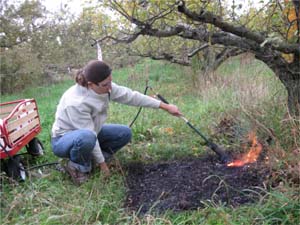Summary:
Organic apple growers in Michigan are experiencing serious losses from the apple flea weevil (AFW). Heavy AFW infestations have caused >90% crop loss for some organic growers. The pest typically goes unnoticed during early stages of infestation because its damage masquerades as frost damage or as sulfur phytotoxicity. Apple flea weevil causes two main types of damage: adult feeding on buds and blossoms and adult and larval feeding on young foliage. In addition to the loss of fruit, extensive leaf feeding by the adults can eventually kill the tree. Organic farmers in the Great Lakes region are desperate for a solution with some facing the possibility of choosing to use conventional pesticides in order to save their trees.
In Michigan, AFW has one generation per year with adults moving to the leaf layer/soil as early as July, where they overwinter. Prolonged contact with the soil makes this a likely place to target control tactics to reduce overwintering populations and hence, spring damage.The objective of this project will be to provide growers with organically acceptable control strategies. We propose to compare application of a biopesticide, cultivation and burning at reducing AFW populations. The biopesticide will be selected from laboratory bioassays funded through other studies. Older literature and our preliminary data suggest that cultivation and burning may be effective techniques.
The pest management tactics proposed in this project have the potential to disrupt non-target organisms and organic fruit production requires a holistic management approach that balances horticultural, pest management, and economic needs. Thus, it is important that our project also measure potential non-target impacts. To accomplish this we will investigate the ecological impact of pest management practices on soil arthropod biodiversity. This will allow us to develop pest management recommendations that consider both the reduction of AFW and their impact on the beneficial invertebrate community. Thus, we will provide organic growers with both cultural and biopesticide based pest management tactics.
Specific project objectives are:
- To determine the efficacy of cultural and biopesticide based management tactics for apple flea weevil adults;
- To determine the non-target ecological impact of organic management practices on soil arthropod biodiversity in an orchard setting;
- Identify the most appropriate management tactic based on economic cost, pest suppression, biodiversity impact, and feasibility.

